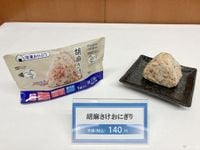Lawson, a prominent convenience store chain in Japan, announced on May 9, 2025, that it will significantly expand the sales of its frozen rice balls, a move aimed at enhancing its product offerings amid rising rice prices. Currently available at around 400 locations in Tokyo, the frozen rice balls will be introduced in approximately 1,700 stores across the Kanto region, including Kanagawa and Chiba, starting May 13, 2025.
The frozen rice balls, which include popular varieties such as the "Sesame Mackerel Rice Ball" priced at 140 yen and the "Grilled Mackerel Rice Ball" at 279 yen, are being marketed at a price point that is 10-20% lower than their room-temperature counterparts. This price reduction is made possible through in-house manufacturing and stocking, which helps Lawson manage costs effectively.
Lawson's strategy is timely, considering the current high prices of rice, which have prompted many consumers to seek more affordable options. By producing these frozen rice balls in bulk, the company aims to not only meet consumer demand but also to provide a product that maintains the same taste and quality as fresh rice balls when thawed. The rapid freezing process ensures that the flavor remains intact, providing a convenient meal option for customers.
In addition to expanding the range of stores selling the frozen rice balls, Lawson plans to increase the total number of locations to about 2,000 by November 2025, with aspirations to have the product available in all stores across Japan by the end of the fiscal year 2026, which is projected for February 2027.
The four types of frozen rice balls being offered include the "Grilled Mackerel Rice Ball," "Chicken and Burdock Rice Ball" priced at 157 yen, "Sesame Mackerel Rice Ball," and "Wakame Rice Ball" at 140 yen. This diverse selection aims to cater to various consumer preferences while maintaining affordability.
One of the notable advantages of frozen rice balls is their extended shelf life. While traditional rice balls typically last about one day, the frozen varieties can be stored for up to a year, significantly reducing food waste. This feature not only benefits consumers but also aligns with broader efforts to minimize food loss in the industry.
Moreover, the logistics of delivering these frozen products are optimized. With regular rice balls requiring deliveries twice a day to maintain freshness, the frozen rice balls will only need to be delivered once daily. This reduction in delivery frequency not only enhances operational efficiency but also contributes to lower CO2 emissions, making it an environmentally friendly option.
As Lawson continues to adapt to changing market conditions and consumer preferences, the expansion of its frozen rice ball offerings represents a strategic response to the challenges posed by rising ingredient costs. The company’s commitment to providing quality, affordable meal options reflects an understanding of the current economic landscape and the needs of its customers.
In summary, Lawson's initiative to broaden the availability of frozen rice balls is a significant development in Japan's convenience store sector, promising both cost savings for consumers and a reduction in food waste. As the company moves forward with its expansion plans, it remains to be seen how this will impact its overall market position and consumer satisfaction.




